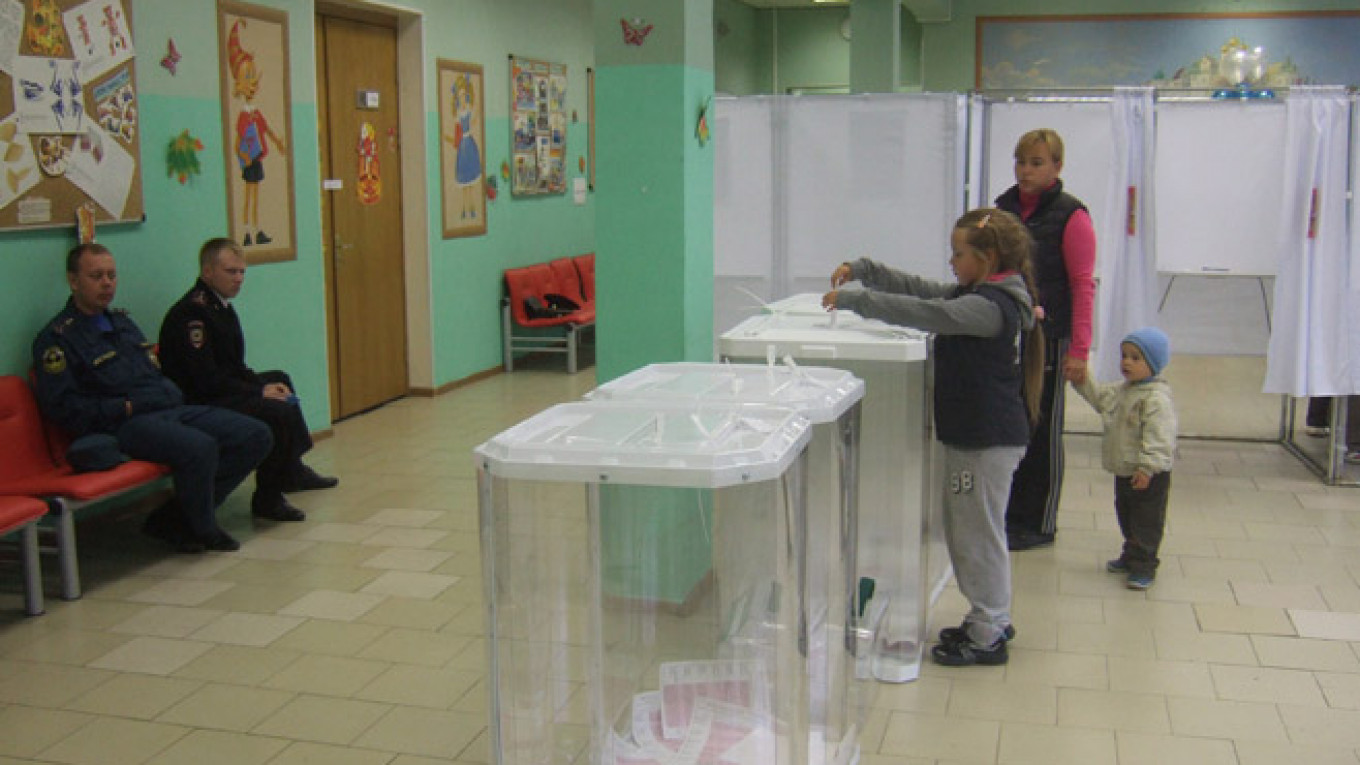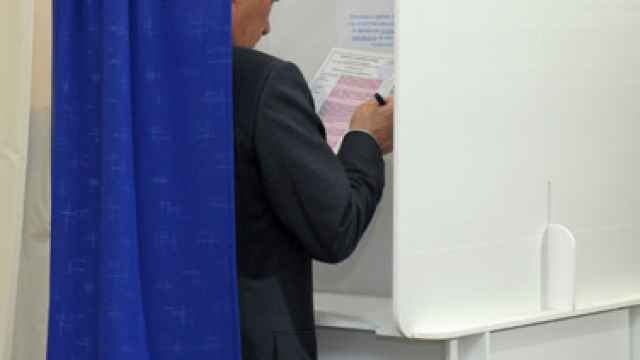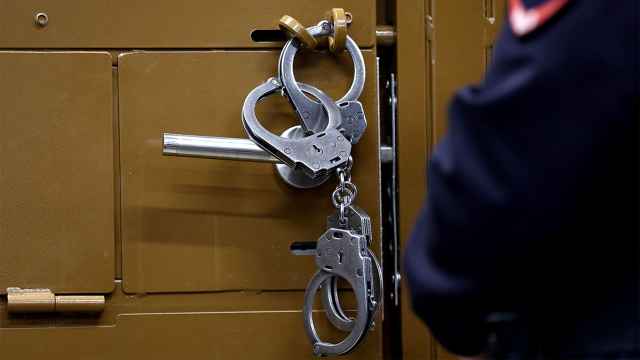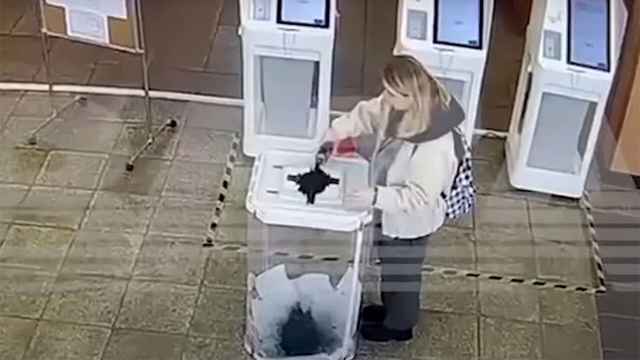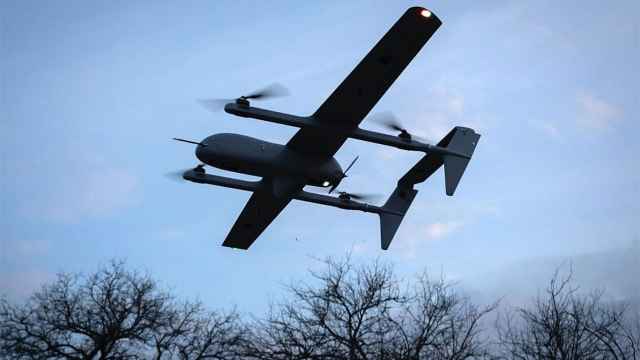Mass apathy and a scarcity of serious challengers to state-preferred candidates were the recurrent themes of Russia's nationwide voting day on Sunday, which pundits said attested to the Kremlin's tightening grip on all levels of the Russian electoral system.
Voters in 84 of the country's 85 federal subjects were summoned to some 64,000 polling stations to elect 30 regional governors, 14 regional and 21 municipal legislatures, as well as other forms of regional authority. But the scale of the exercise did not match the population's lackluster enthusiasm for Sunday's events, which has been molded by two decades of electoral rigging and the stifling of political alternatives, according to independent observers.
Low Turnouts
Members of the opposition have accused President Vladimir Putin of constricting the country's electoral system by creating a facade of openness, which they say has contributed to a consolidation of the Kremlin's control over regional and local politics.
In 2012, Putin reinstated direct gubernatorial elections, after having initially banned them in 2004.
Last year, Putin signed legislation vesting regions with the right to choose whether to elect their governors directly, or to let regional legislatures pick from a list of Kremlin-approved candidates.
The vast majority of those registered to vote in Moscow's City Duma elections, in fact, snubbed Sunday's poll. As of 3 p.m., the turnout was nearly 13 percent. Dmitry Oreshkin, the head of the Merkator research group, which monitors regional Russian politics, told The Moscow Times on Sunday that the turnout would be unlikely to exceed 15 to 20 percent by close of polling stations at 8 p.m.
"The fewer people that come out and vote, the better it is for authorities," Oreshkin said, adding: "People don't trust the system and feel the regional and local levels in government don't really have a say in anything."
Interest in the gubernatorial and regional legislative votes were only slightly higher outside Moscow. By 3 p.m the turnout for St. Petersburg's gubernatorial elections was nearly 20 percent, while 19 percent of voters of the Rostov region had cast their ballots in municipal elections. Enthusiasm for the polls was only marginally higher in Crimea and Sevastopol, Russia's latest additions into its federal fold, where turnouts had risen respectively to 22 and 19 percent by midday.
Sunday's political exercise in Moscow had been rehearsed last June through the city's first non-binding primaries. But while supporters of this rehearsal insisted it would help voters get acquainted with candidates' platforms without affecting the results on election day, its detractors warned that doubling the exercise could blur Muscovites' electoral judgement and increase voter fatigue.
The apathy infused into the bloodstream of the Russian population feeds into the general sentiment that decisions are made at the highest echelons of power, and that the elected regional and municipal leaders answer to decision-makers at the federal level. This sentiment translates into far greater popular interest in federal politics, where the turnout of the latest parliamentary and presidential elections in 2011 and 2012 exceeded 60 percent.
Weeding Out the Opposition
The self-confessed weakness and lack of consolidation within Russia's nonsystemic opposition have created significant problems for candidates that fall outside of the political mainstream, but these factors alone may not account for the lack of true opposition candidates on the ballots, analysts said.
"Even if the nonsystemic opposition members were more active, the situation would be the same," said Andrei Buzin, election-monitoring director at Golos, an independent election monitoring organization. "The level of competition is very low. All the serious challengers were filtered out before they could even run."
The only potential challenger to the long-standing governor of St. Petersburg, Georgy Poltavchenko, was State Duma deputy Oksana Dmitriyeva, of opposition party A Just Russia. Dmitriyeva, a liberal economist who has been eyed by her party as a potential presidential candidate, was unable to gather enough signatures on the municipal level to register to run in her region's gubernatorial elections.
"My party will likely not recognize the results of the St. Petersburg gubernatorial elections and other polls," Dmitriyeva told The Moscow Times in a telephone interview Sunday, after having spoiled her ballot by entering check marks in every single box. "There have been criminal violations during these electoral procedures."
Political activists Olga Romanova and Maria Gaidar were faced with similar registration barriers when they attempted to register as candidates for the Moscow legislature. In August, a Moscow court rejected Gaidar's appeal of the decision that prevented her from running in Sunday's election.
Violations
Election monitor Golos had received 656 complaints of electoral violations from voters by 8 p.m. Sunday, including 115 from Moscow. Authorities meanwhile maintained that electoral procedures and regulations were generally closely observed across the country.
The Public Committee for Election Observation in Moscow monitoring group said that its observers had not recorded recorded any electoral violations as of 1 p.m., and that the dozen or so suspected violations witnessed via video surveillance of the polls had not, in fact, constituted violations.
The committee conceded that 46 polling stations had encountered technical difficulties with at least one of their two cameras. The secretary of the public committee, Oleg Bocharov, said that both cameras in three polling stations had failed at the same time, preventing video monitoring of the political exercise for a maximum of 20 minutes, but that no violations had taken place during that time, Interfax reported.
The stated absence of blatant electoral fraud in the polls came as no surprise to leaders of the nonsystemic opposition. Firebrand opposition blogger Alexei Navalny, a leader of the anti-government street protests of 2011 and 2012 who is currently under house arrest, wrote in a blog post that the constriction of the electoral system had naturally led to the state-approved candidate's "ability to achieve victory without significant fraud."
A number of colorful incidents also reportedly hampered voting at certain polling stations.
Three Femen activists, including citizens of Ukraine, were detained after removing their clothing at a polling station in downtown Moscow, TASS reported. Other incidents included an inebriated individual who allegedly obstructed Dmitriyeva's access to the ballot box in St. Petersburg.
Contact the author at g.tetraultfarber@imedia.ru


